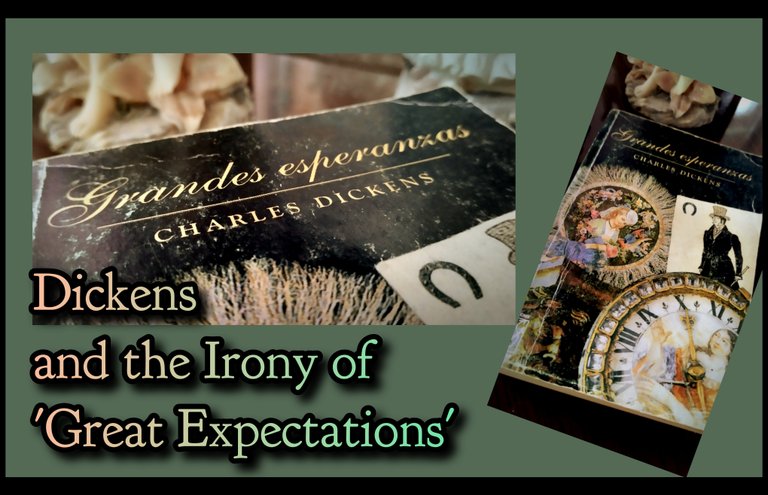
I discovered this novel in my early adolescence, and it made me fall in love with its author. Considered one of Charles Dickens’ most celebrated works, Great Expectations is undoubtedly a masterpiece of English literature.
The story follows Pip, an orphan raised by his sister and the kind-hearted blacksmith Joe Gargery, who dreams of overcoming his social status from his humble beginnings in the marshes. His life takes a turn when he helps an escaped convict, and years later, he receives news that an anonymous benefactor has granted him a fortune to become a gentleman in London.
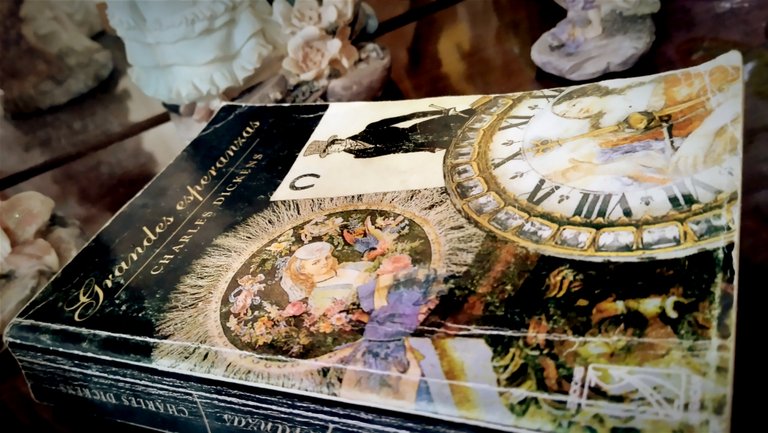
Unaware of who his mysterious protector is, Pip assumes it is the eccentric and wealthy Miss Havisham, who invites him to play with her adopted daughter Estella: a cold and distant young woman who constantly scorns him for his humble origins. Driven by his unrequited love for Estella and his desire for social advancement, Pip gradually distances himself from his roots as he immerses himself in London life.
Whenever I summarize this novel, I can’t help but recall its film and TV adaptations, and I swear none of them do justice to Dickens’ relentless narrative or the dramatic richness of the story.
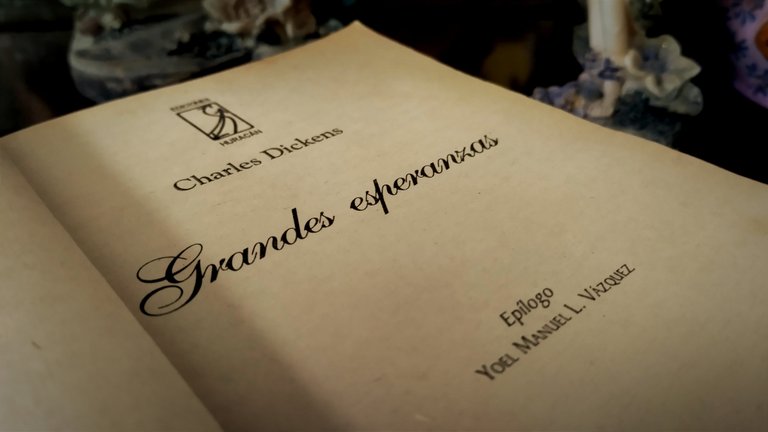
As you may notice, the novel’s title is deeply ironic, for Pip believes his sudden wealth and love for Estella will bring him happiness, only to discover his expectations are built on lies and deceit. Through this, Dickens critiques the idea that status and money guarantee personal fulfillment.
Victorian England was a rigidly stratified society, and Dickens shows how Pip, upon adopting upper-class manners, becomes arrogant and looks down on those who raised him, challenging the false notion that social climbing improves people when, in fact, it corrupts them.
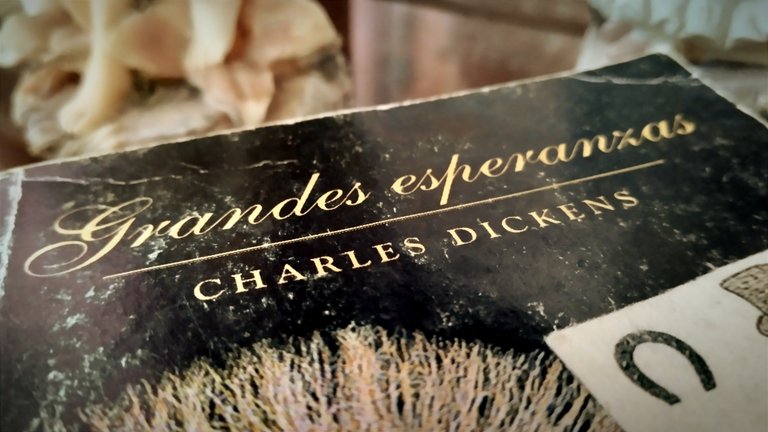
As an incurable romantic, the themes of love and redemption in the novel are what always draw me back to rereading it. Pip’s unrequited love for Estella not only symbolizes obsession with the unattainable but also exposes human cruelty, as Miss Havisham uses Estella to exact revenge on men, a passage that is the final product of her bitterness.
One of the most enchanting aspects of Dickens’ narration is his richly descriptive language and the use of the first person, as the novel is written from Pip’s adult perspective, with plot twists so skillfully crafted that they never fail to surprise.
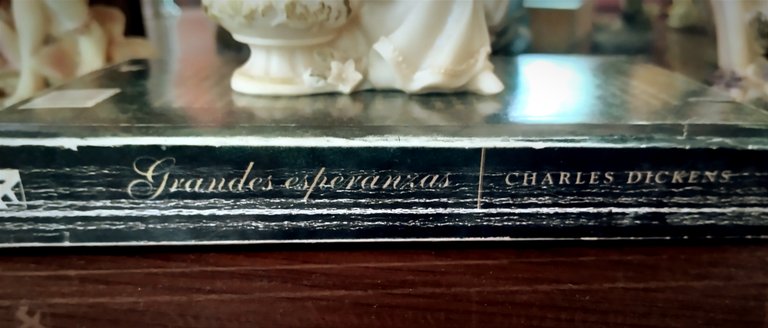
Without a doubt, Great Expectations transcends time: it not only portrays the contradictions of Victorian society but also offers a universal reflection on ambition, regret, and forgiveness. It remains relevant today by reminding us that great expectations must never blind us to what truly matters.
The characters, plot, and prose, filled with humor and occasional pathos, are unforgettable, making this essential reading for anyone seeking a story with emotional depth. The moral resonates clearly: happiness cannot be bought; it is built through humility and self-awareness.
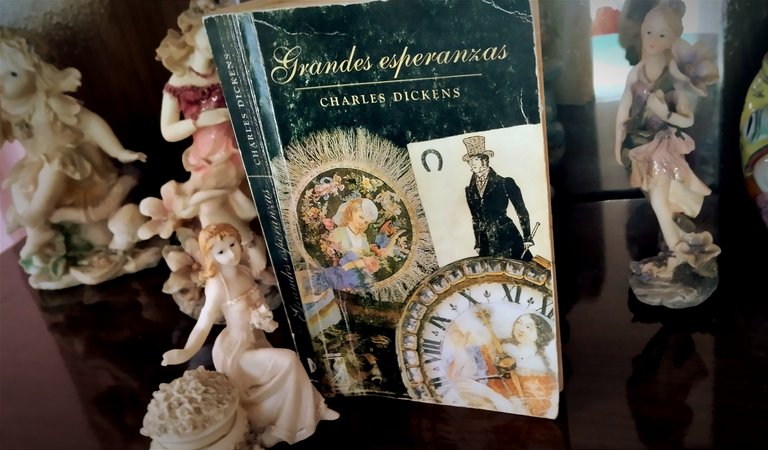

✨ 𝑻𝒉𝒂𝒏𝒌𝒔 𝒇𝒐𝒓 𝒓𝒆𝒂𝒅𝒊𝒏𝒈! ✨
𝑰𝒇 𝒚𝒐𝒖 𝒅𝒐𝒏’𝒕 𝒌𝒏𝒐𝒘 𝒎𝒆 𝒚𝒆𝒕, 𝑰’𝒎 𝒂 𝑪𝒖𝒃𝒂𝒏 𝒏𝒆𝒖𝒓𝒐𝒍𝒐𝒈𝒊𝒔𝒕 𝒂𝒏𝒅 𝒘𝒓𝒊𝒕𝒆𝒓, 𝒂 𝒎𝒐𝒕𝒉𝒆𝒓, 𝒂 𝒘𝒐𝒎𝒂𝒏, 𝒂𝒏𝒅 𝒂 𝒅𝒓𝒆𝒂𝒎𝒆𝒓 𝒘𝒉𝒐’𝒔 𝒇𝒐𝒖𝒏𝒅 𝒊𝒏 𝑯𝒊𝒗𝒆 𝒂 𝒃𝒆𝒂𝒖𝒕𝒊𝒇𝒖𝒍 𝒔𝒑𝒂𝒄𝒆 𝒕𝒐 𝒔𝒐𝒂𝒓.
𝑨𝒍𝒍 𝒕𝒆𝒙𝒕 𝒂𝒏𝒅 𝒊𝒎𝒂𝒈𝒆𝒔 𝒂𝒓𝒆 𝒎𝒚 𝒐𝒓𝒊𝒈𝒊𝒏𝒂𝒍 𝒄𝒓𝒆𝒂𝒕𝒊𝒐𝒏𝒔, 100% 𝒉𝒖𝒎𝒂𝒏-𝒎𝒂𝒅𝒆 (𝒏𝒐 𝑨𝑰).
𝑩𝒂𝒏𝒏𝒆𝒓 𝒅𝒆𝒔𝒊𝒈𝒏𝒆𝒅 𝒃𝒚 𝑳𝒖𝒎𝒊𝒊.
𝑳𝒐𝒗𝒆𝒅 𝒕𝒉𝒊𝒔 𝒑𝒐𝒔𝒕? 𝑼𝒑𝒗𝒐𝒕𝒆, 𝒄𝒐𝒎𝒎𝒆𝒏𝒕, 𝒐𝒓 𝒓𝒆𝒃𝒍𝒐𝒈 𝒕𝒐 𝒔𝒑𝒓𝒆𝒂𝒅 𝒕𝒉𝒆 𝒘𝒊𝒏𝒈𝒔 𝒐𝒇 𝒄𝒓𝒆𝒂𝒕𝒊𝒗𝒊𝒕𝒚! 💛

VERSIÓN EN ESPAÑOL

Dickens y la ironía de las 'Grandes Esperanzas' || Reseña
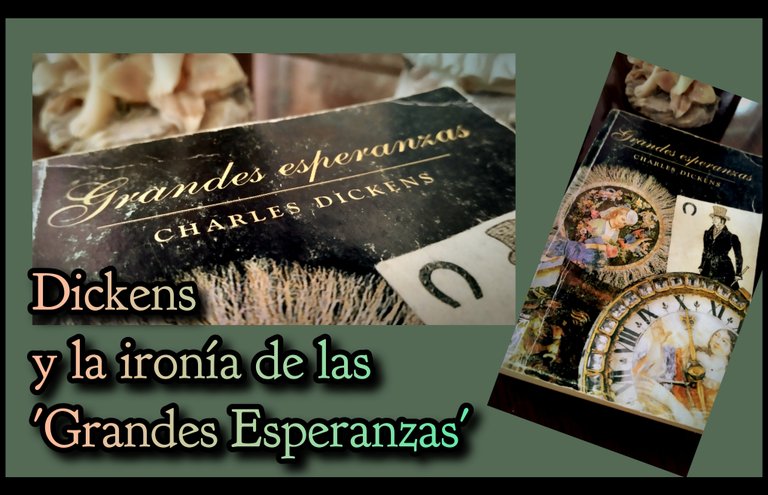
Descubrí esta novela en mi adolescencia temprana, y logró que me enamorara de su autor. Considerada una de las obras más celebradas de Charles Dickens, Grandes Esperanzas es, sin duda, una obra maestra de la literatura inglesa.
La historia sigue a Pip, un huérfano criado por su hermana y el bondadoso herrero Joe Gargery, quien sueña con superar su condición social desde sus humildes comienzos en los pantanos. Su vida da un giro cuando ayuda a un convicto fugado y, años después, recibe la noticia de que un benefactor anónimo le ha concedido una fortuna para convertirlo en un caballero en Londres.

Sin saber quién es su misterioso protector, Pip asume que es la excéntrica y adinerada Miss Havisham, quien lo invita a jugar con su hija adoptiva Estella: una joven fría y distante que lo desprecia constantemente por sus orígenes humildes. Movido por su amor no correspondido hacia Estella y su deseo de ascender socialmente, Pip se aleja poco a poco de sus raíces mientras se sumerge en la vida londinense.
Cada vez que resumo esta novela, no puedo evitar recordar sus adaptaciones cinematográficas y televisivas, y les juro que ninguna hace justicia a la implacable narración de Dickens ni a la riqueza dramática de la historia.

Como notarán, el título de la novela es profundamente irónico, pues Pip cree que su riqueza repentina y su amor por Estella lo llevarán a la felicidad, solo para descubrir que sus expectativas están construidas sobre mentiras y engaños. A través de esto, Dickens critica la idea de que el estatus y el dinero garantizan la realización personal.
La Inglaterra victoriana era una sociedad rígidamente estratificada, y Dickens muestra cómo Pip, al adoptar las costumbres de la clase alta, se vuelve arrogante y menosprecia a quienes lo criaron, desafiando la falsa noción de que el ascenso social mejora a las personas, cuando, de hecho, las corrompe.

Como romántica empedernida, los temas del amor y la redención en la novela son lo que siempre me hace volver a leerla. El amor no correspondido de Pip por Estella no solo simboliza la obsesión por lo inalcanzable, sino que también expone la crueldad humana, ya que Miss Havisham usa a Estella para vengarse de los hombres, un pasaje que es el resultado final de su amargura.
Uno de los aspectos más cautivadores de la narración de Dickens es su lenguaje rico en descripciones y el uso de la primera persona, ya que la novela está escrita desde la perspectiva adulta de Pip, con giros argumentales tan hábilmente construidos que nunca dejan de sorprender.

Sin duda, Grandes Esperanzas trasciende el tiempo: no solo retrata las contradicciones de la sociedad victoriana, sino que también ofrece una reflexión universal sobre la ambición, el arrepentimiento y el perdón. Sigue siendo relevante hoy al recordarnos que las grandes esperanzas nunca deben cegarnos ante lo que realmente importa.
Los personajes, la trama y la prosa, llena de humor y, a veces, patetismo, son inolvidables, lo que la convierte en una lectura esencial para quienes buscan una historia con profundidad emocional. La moraleja resuena claramente: la felicidad no se compra, se construye con humildad y autoconocimiento.


✨ ¡𝑮𝒓𝒂𝒄𝒊𝒂𝒔 𝒑𝒐𝒓 𝒍𝒆𝒆𝒓! ✨
𝑺𝒊 𝒂ú𝒏 𝒏𝒐 𝒎𝒆 𝒄𝒐𝒏𝒐𝒄𝒆𝒔: 𝒔𝒐𝒚 𝒏𝒆𝒖𝒓ó𝒍𝒐𝒈𝒂 𝒚 𝒆𝒔𝒄𝒓𝒊𝒕𝒐𝒓𝒂 𝒄𝒖𝒃𝒂𝒏𝒂, 𝒎𝒂𝒅𝒓𝒆, 𝒎𝒖𝒋𝒆𝒓 𝒚 𝒔𝒐ñ𝒂𝒅𝒐𝒓𝒂 𝒒𝒖𝒆 𝒆𝒏𝒄𝒐𝒏𝒕𝒓ó 𝒆𝒏 𝑯𝒊𝒗𝒆 𝒖𝒏 𝒉𝒆𝒓𝒎𝒐𝒔𝒐 𝒆𝒔𝒑𝒂𝒄𝒊𝒐 𝒑𝒂𝒓𝒂 𝒗𝒐𝒍𝒂𝒓.
𝑬𝒍 𝒕𝒆𝒙𝒕𝒐 𝒚 𝒍𝒂𝒔 𝒊𝒎á𝒈𝒆𝒏𝒆𝒔 𝒔𝒐𝒏 𝒅𝒆 𝒎𝒊 𝒂𝒖𝒕𝒐𝒓í𝒂, 100% 𝒉𝒖𝒎𝒂𝒏𝒐𝒔 (𝒔𝒊𝒏 𝑰𝑨).
𝑩𝒂𝒏𝒏𝒆𝒓 𝒅𝒊𝒔𝒆ñ𝒂𝒅𝒐 𝒑𝒐𝒓 𝑳𝒖𝒎𝒊𝒊.
¿𝑻𝒆 𝒈𝒖𝒔𝒕ó 𝒆𝒔𝒕𝒂 𝒑𝒖𝒃𝒍𝒊𝒄𝒂𝒄𝒊ó𝒏? 𝑽𝒐𝒕𝒂, 𝒄𝒐𝒎𝒆𝒏𝒕𝒂 𝒐 𝒓𝒆𝒃𝒍𝒐𝒈𝒖𝒆𝒂 𝒑𝒂𝒓𝒂 𝒂𝒚𝒖𝒅𝒂𝒓 𝒂 𝒅𝒆𝒔𝒑𝒍𝒆𝒈𝒂𝒓 𝒆𝒔𝒕𝒂𝒔 𝒂𝒍𝒂𝒔. 💛

